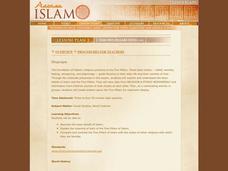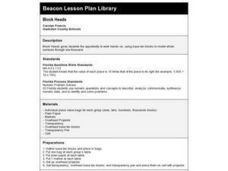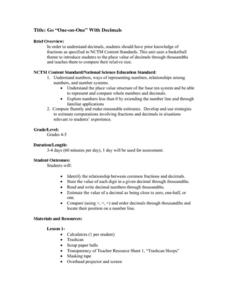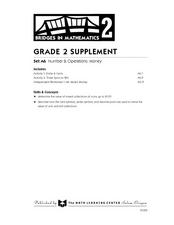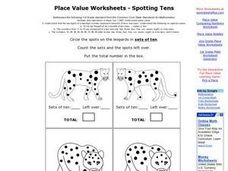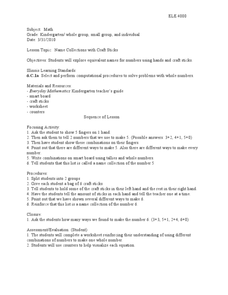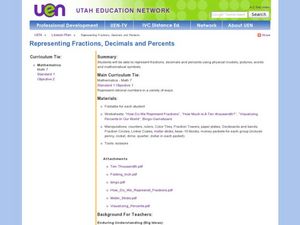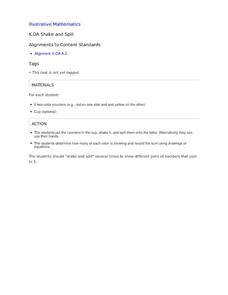Curated OER
Making 10
Brilliant! This presentation helps kids discover all the different way they can make 10. Each slide contains 10 balls, as the kids count, each ball blinks, and the number appears under them to show how many. A plus sign pops up and the...
Curated OER
"Reviewing Facts Through 10" Lesson Plan
Explore the joy of math with you little learners! They practice creating math problems with numbers from a fact family using numbers 1-10. They work independently with a set of connecting cubes to aid them in creating number sentences...
Curated OER
Number Patterns in Everyday Life
Examine scenarios involving number patterns. Learners complete a series of activities, including working with Pascal's triangle ando completing chart activities based on different pricing for pizza toppings. An included extension has...
Curated OER
The Five Pillars of Islam
In order to better understand Muslim civilization, culture, and politics one must first familiarize themselves on the 5 Pillars of Islam, ideas which dominate much of Muslim societal and cultural norms. Provide your learners with a...
DK Publishing
Writing Equivalent Number Sentences
Connect the four operations with a series of number sentences. After studying the examples at the top of the page, third graders find ways to write related number sentences for addition, subtraction, multiplication, and division...
Curated OER
Add Groups of Ten
In this addition learning exercise, students add groups of tens and their remainders to determine the missing addends in the pairs of 2-digit problems and then find the sums. Students solve nine problems.
Curated OER
Top Ten Tips for a Successful Back to School Night
Here are my top ten tips to ensure that you have a fantastic Back to School Night.
Curated OER
Block Heads
Students demonstrate whole numbers through one thousand using base ten blocks. They model and describe given numbers using ten blocks.
Curated OER
Developing Number Concepts
Children count and group a set of beans, sorting into groups of 10 and noting the number that remains. Students understand the concept of numbers greater than ten, and play a game, guessing numbers greater than 10 using hints given by...
Curated OER
Choral Counting II
Using a number line or a 100s chart that extends past 100, practice counting from 1 to 120 with your class. As a part of daily instruction, chant count in sequence from 1 to 100 and then randomly chose a number and count onward to 120....
PBS
10 Preparation Steps for a Successful Group Presentation
As the title suggests, this four-page template details the essential steps in the preparation of a group presentation. Formatted as a checklist, group members use the pages to identify who is to do what and when each aspect is due. Also...
National Security Agency
Go One-on-One with Decimals
Shoot and score with three basketball-themed lessons about decimals. Young mathematicians compare game statistics, make trash can hoops, and play a data spinner game to practice identifying digits and values within decimal numbers.
Curated OER
Three Skeleton Key: Elements of Literature
Rats! How are they described in "Three Skeleton Key," and what happens to the characters in the story? Study the vocabulary and the story with these worksheets. Learners complete pre-reading activities, study vocabulary, complete...
Math Learning Center
Grade 2 Supplement Set A6 – Number and Operations: Money
Young scholars get familiar with money during this series of engaging math activities. A game has class teams accumulating money and using symbol and number cards to display their total amount correctly on a pocket chart. All the symbol...
National Endowment for the Humanities
The House Un-American Activities Committee
Was the House Un-American Activities Committee justified in investigating subversive influences in the entertainment industry? Part two of the three-part series of lessons that examine the anti-communism movement after World War II,...
Curated OER
Base Ten Blocks: Representing Numbers (B)
In this finding the value of base ten blocks worksheet, students use flats, rods, and units to determine the total values. Students solve 4 problems.
Curated OER
Base Ten Blocks—Representing Numbers (D)
In this counting base ten blocks learning exercise, students read a brief instructional guide and fill in the blanks in 4 statements pertaining to the units pictured in each of the 4 problems.
Curated OER
Leopards: Spotting 10s
Count the spots on 4 pictured leopards and circle groups of 10. Count the extras. Write how many 10s and how many "left overs" in blank spaces. Write the total number in a box. Can a leopard change its spots? Enrich this math tool by...
Curated OER
Name Collections with Craft Sticks
Groups of Kindergarten students count craft sticks in different groups and name how many they have. They complete simple addition to ten with the use of manipulatives.
Curated OER
Representing Fractions, Decimals, and Percents
In this fractions, decimals, and percents lessons, students explore various methods of representing fractions. They demonstrate situations that represent rational numbers. Students create a foldable exploring fractions, decimals and...
Math Learning Center
Grade 1 Supplement Set A4 – Number and Operations: Equivalent Names
Engage young mathematicians in developing their basic arithmetic skills with these great hands-on activities. Using Unifix® cubes to model a variety of single digit addition and subtract problems, children build a basic understanding of...
Illustrative Mathematics
Shake and Spill
Entertaining as well as educational, this math activity about decomposing numbers is bound to capture the engagement of young learners. Given a cup and five two-color counters, young mathematicians simply shake and spill the cup,...
Mathwire
A Collection of Logic Number Puzzles on the Hundred Board
What's my number? Spark mathematical thinking and have some fun with thirty number puzzles that pose a series of questions to guide learners towards number discovery.
EngageNY
Summarizing Bivariate Categorical Data in a Two-Way Table
Be sure to look both ways when making a two-way table. In the lesson, scholars learn to create two-way tables to display bivariate data. They calculate relative frequencies to answer questions of interest in the 14th part of the series.





